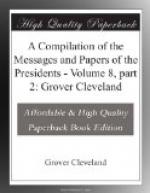Under pretended blockades, without the presence of an adequate force and sometimes without the practicability of applying one, our commerce has been plundered in every sea, the great staples of our country have been cut off from their legitimate markets, and a destructive blow aimed at our agricultural and maritime interests. In aggravation of these predatory measures they have been considered as in force from the dates of their notification, a retrospective effect being thus added, as has been done in other important cases, to the unlawfulness of the course pursued. And to render the outrage the more signal these mock blockades have been reiterated and enforced in the face of official communications from the British Government declaring as the true definition of a legal blockade “that particular ports must be actually invested and previous warning given to vessels bound to them not to enter.”
Not content with these occasional expedients for laying waste our neutral trade, the cabinet of Britain resorted at length to the sweeping system of blockades, under the name of orders in council, which has been molded and managed as might best suit its political views, its commercial jealousies, or the avidity of British cruisers.
To our remonstrances against the complicated and transcendent injustice of this innovation the first reply was that the orders were reluctantly adopted by Great Britain as a necessary retaliation on decrees of her enemy proclaiming a general blockade of the British Isles at a time when the naval force of that enemy dared not issue from his own ports. She was reminded without effect that her own prior blockades, unsupported by an adequate naval force actually applied and continued, were a bar to this plea; that executed edicts against millions of our property could not be retaliation on edicts confessedly impossible to be executed; that retaliation, to be just, should fall on the party setting the guilty example, not on an innocent party which was not even chargeable with an acquiescence in it.
When deprived of this flimsy veil for a prohibition of our trade with her enemy by the repeal of his prohibition of our trade with Great Britain, her cabinet, instead of a corresponding repeal or a practical discontinuance of its orders, formally avowed a determination to persist in them against the United States until the markets of her enemy should be laid open to British products, thus asserting an obligation on a neutral power to require one belligerent to encourage by its internal regulations the trade of another belligerent, contradicting her own practice toward all nations, in peace as well as in war, and betraying the insincerity of those professions which inculcated a belief that, having resorted to her orders with regret, she was anxious to find an occasion for putting an end to them.




